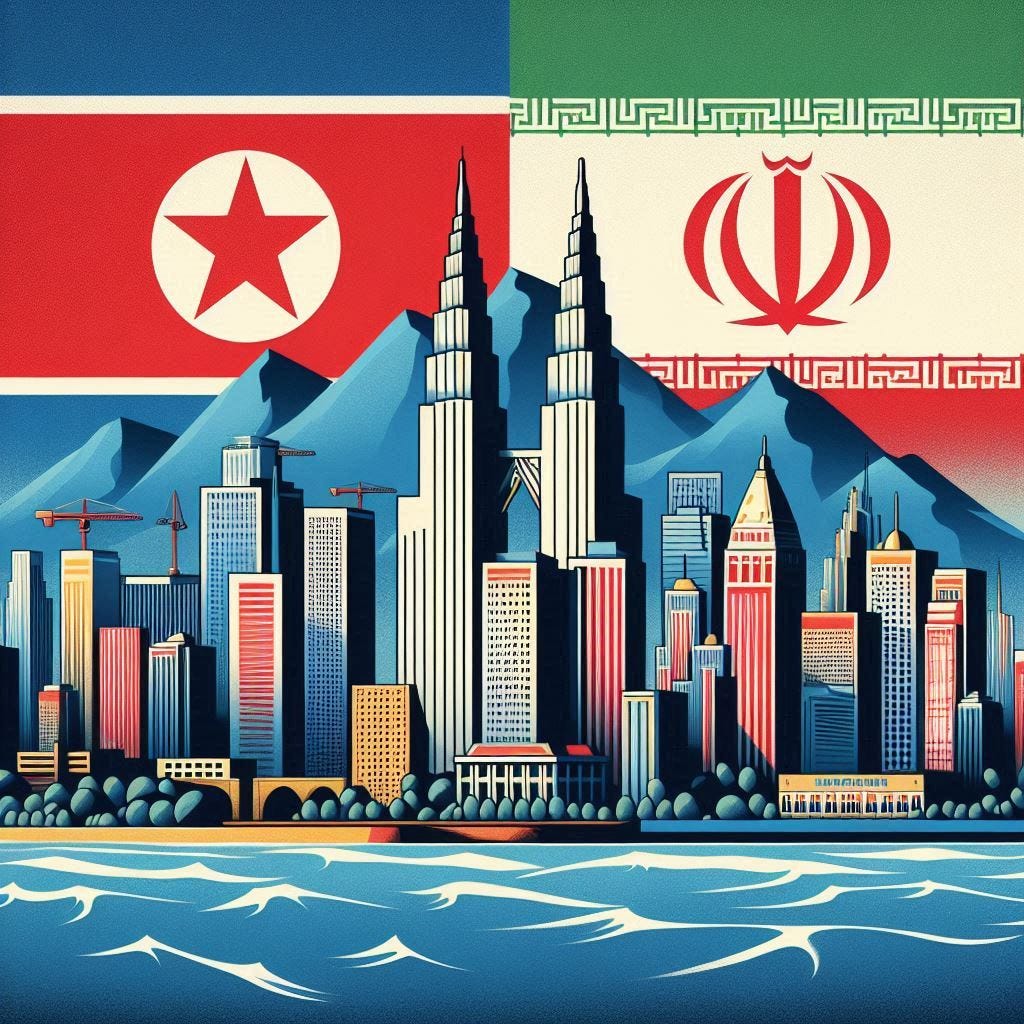Russia helping with DPRK launch tech; NK regional banks drawing in more funds; Tehran slowly adding aircraft to civilian fleet; Iranian oil production may rise
Prohibited Transactions for the week of 27 May 2024 (#50)
This image was created in Microsoft Copilot Designer on 30 May 2024 using the prompt “logo of a city landscape with North Korean and Iranian flags in the background”
North Korea
A number of Russian technicians appear to have entered North Korea to assist with Pyongyang’s satellite launch efforts, according to South Korean defense officials.
The recent failed North Korean satellite launch likely due to sanctions preventing the DPRK from getting the right technology for the launch, according to South Korea’s presidential office.
The US Defense Intelligence Agency released an unclassified report confirming previous analysis (see Issue #38) that North Korean ballistic missiles have been used by Russia in Ukraine.
The US Treasury Department released a risk assessment for non-fungible tokens (NFTs), noting that in 2022 North Korean illicit actors raised more than USD720 million by attacking virtual asset projects and firms. The report cited one DPRK theft potentially related to NFTs, though the amount stolen was limited compared to their overall illicit activities. North Korea likely has the technical expertise to continue to abuse NFTs to raise funds for the regime. //The overall hype for NFTs has really died down, though it seems that they’ll be sticking around in some form or another in the digital assets ecosystem. If the value of NFTs rise in the next few years, North Korean hackers will surely look for new ways to exploit the technology for their gain.
According to covert reporting from inside North Korea, regional banks in the country have recently been given more autonomy as part of a push to encourage residents to sign up for bank installment plans, which results in increased liquidity for the banks and the ability to offer larger lines of credit to businesses.
Though workers are reportedly more willing to trust the banks (see issue #26) entrepreneurs, money changers, and wholesalers — who actually have more funds under their control — are wary to trade their US dollars and Chinese yuan into North Korean won for deposit.
--
Seoul may take legal action against Pyongyang if the North expands its unauthorized use of the now-shuttered Kaesong Industrial Complex.
For the first time since 1989, there was no recorded cross-border trade between North and South Korea. The value of humanitarian aid from South to North also dropped to USD653,000, the smallest amount since 1995.
US humanitarian groups are slowly starting to sending aid into the DPRK, delivering approximately USD200,000 worth of medical and lab equipment between November 2023 and March 2024.
Iran
Between March and May 2024, Iran imported 4.6 metric tons of gold, worth USD330 million, which is 3.8 times more than the same period last year. //The import of gold is part the government’s strategy to blunt the impact of sanctions, as it allows businesses to settle foreign exchange dues owed to the government. It also shifts the risks and logistical burden away from the government and onto the companies importing the gold. The government can then use the gold for any illicit payments that it wants to make.
From August 2021 through March 2024, Iran added 92 airplanes and helicopters to the nation’s air fleet. //As discussed in Issue #39, Iran’s civil aviation authorities stated that domestic passenger demand alone requires 300 new airplanes. When taking into account the somewhat tortured process (see Issue #7) Iran must go through to illicitly acquire a used airplane, banks and payment processors should be on the lookout for front companies tied to Iran’s airlines or aviation sector.
Iran’s Council of Economy approved a plan in principle to increase the country’s oil production by 400,000 barrels per day (bpd), from 3.6 million to 4 million bpd. //In the aftermath of the death of Iranian President Ebrahiam Raisi, Iranian media has lauded the increase in oil exports that took place during his time in office. In the first three months of 2024, Tehran sold on average 1.56 million bpd, mostly to the PRC. As discussed in Issue #28, much of the oil is being purchased by Chinese teapot refineries with minimal exposure to the US dollar financial system, so it will be interesting to see if recent sanctions signed into law by US President Joe Biden will have any impact on sales to Beijing.
--
In meetings with the International Road Transport Union (IRU), the Iran Chamber of Commerce emphasized that their priority is enhancing regional corridors. The IRU urged Iran to boost cooperation in these areas with countries in the region, in particular Iraq, Saudi Arabia and the UAE.

